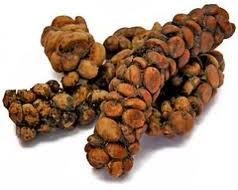
Kopi Luwak: Good to the last dropping
“Kopi Luwak, or Civet Cat Coffee, which in recent years has gained renewed attention worldwide, has been in existence since the eighteenth century. Kopi Luwak, a rare speciality coffee, is the most expensive beverage in the world. It has a staggering price-tag ranging from 100 to 6600 US dollars per kilogram! What’s more, there are eager connoisseurs willing to pay serious money for this uniquely processed coffee.
However, how this speciality ‘value-added’ coffee is produced may not be as palatable to the non cognoscenti. Luwak is a civet cat found in south and south-east Asia. It eats the ripe coffee fruits that are sweetish in taste. Civet cats consume the fruits along with the seeds, and the hard seeds are not damaged in the process. The seeds pass through the alimentary canal of the cat during which it comes in contact with the digestive juices and enzymes in the bowels of this small mammal. The coffee seeds are not digested, but undergo a similar process as in a pulping-cum-washing machine where the outer skin and the sticky mucilage are removed. In addition, the enzymes in the animal’s stomach add ‘something unique’ to the coffee’s flavour through fermentation.
The undigested coffee seeds are expelled by the animal after about 36 hours in its digestive tract. These are painstakingly gathered. This ‘civet cat processed coffee’ apparently gets an earthy and bold aroma with no bitterness or aftertaste. These coffee beans are thoroughly cleaned and then roasted at 249 degrees C. Since production of this special coffee is entirely dependent on the civet cat, the quantities are very small, which makes it an expensive proposition. The roasted seeds are then packaged and people who buy it have no qualms in paying the price for the unique taste of coffee brewed.
Civet cat coffee was first discovered in the Dutch colonies in Sumatra and Java where coffee cultivation was introduced during early 18th century. The Dutch colonizers prohibited the locals from consuming coffee. The workers in the coffee estates were keen on tasting the famed beverage. They gathered coffee seeds expelled by the civet cats and secretly brewed coffee. This went on for a few years. When the locals were finally allowed to brew coffee harvested from the plantations they found the civet cat coffee that they were drinking tasted much better. This news reached the Dutch, and when they tasted the civet cat coffee they too found it far superior to the normal brew. This specialty coffee soon gained popularity not only amongst the Dutch coffee planters but also in Europe and other countries. The rarity of the product made it expensive even during the colonial period.
In recent years, demand for civet cat coffee has increased multifold, and it has turned out to be a very lucrative product. The demand far outweighs production.
Some of the coffee growers in Indonesia have started breeding civet cats in their estates. These cats are fed ripe coffee fruits in order to collect the ‘value added’ seeds expelled by them.
The other day I received a phone call from a friend in Delhi. He wants my help in purchasing an acre of land in Coorg next to a coffee estate (preferably mine!) He is an expert dog-trainer, and is confident of training a pack of civet cats. His plan is to rear these cats in the one acre plot where he will also build a small holiday cottage. During the coffee season he plans let loose his toilet-trained cats to feast on coffee fruits and come back to his farm to deposit their valuable poop! He figures he and his family could enjoy three months vacation in Coorg, and get back to Delhi with the valuable droppings of his army of civet cats. A win-win situation, according to this astute businessman.
One of the hottest selling brands of civet cat coffee in the USA is named ‘Kopi Luwak’, and its label promotes it appropriately as: Good To The Last Dropping!”

